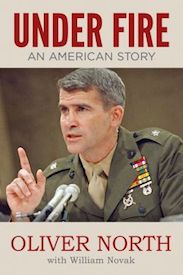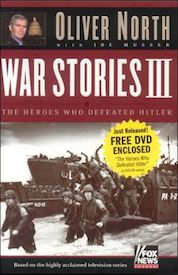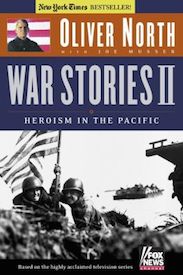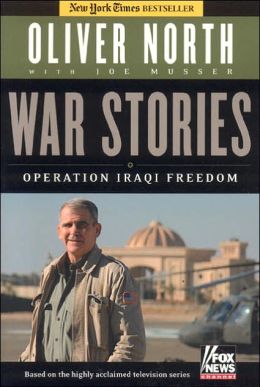Under Fire: An American Story
Lieutenant Colonel Oliver L. North, USMC Ret., once referred to as “the most powerful lieutenant colonel in the world,” played a prominent role in US foreign affairs in the 1980s. That fact alone would make his book worth reading. In Under Fire we hear his story, presented as a fast-paced autobiographical narrative. From the man who mesmerized the American public through the Iran-contra hearings, we would expect nothing less than a bravura performance. Most reflective readers, however, will be disquieted by North’s story.
Without question, the book makes fascinating reading. A distinct personality emerges from its pages. Others will have to determine whether that personality represents the real Oliver North, but I suspect that it does. The co-writer, William Novak, clearly deserves praise for the consistent tone and the straightforward style of presentation.
The brief sketch of North’s family background and the highlights of his early career at the Naval Academy and in the Marine Corps help to delineate the character of the man who joined the National Security Council staff in 1981. He had established himself as a charismatic combat leader in Vietnam and as a man of uncommon determination. In his first year at the Naval Academy, he suffered severe injuries in an automobile accident. Doctors worried about the degree to which he would be able to walk, let alone qualify as a naval officer, but with the gritty persistence that characterized his later actions, he not only returned to graduate and become a Marine, but he also became a Naval Academy boxing champion along the way. By all accounts, he was a superb soldier who generated fierce loyalty in his subordinates–and returned it. Both the Marine Corps and the nation would have been far better served had he remained a leader of Marines. The USMC would now have a highly competent senior officer, and the nation might have been spared the political turmoil of the Iran-contra affair, not to mention the expenditure of $40 million that North reports the special prosecutor, Lawrence Walsh, has spent investigating those involved. For make no mistake, without Oliver North the Iran initiative would certainly have developed differently and the profits from the arms sales to Iran most probably would not have been diverted to support the contra resistance in Nicaragua. As he frequently said with pride, Oliver North made things happen.
Though he arrived in Washington in 1981 as an obscure staffer, he very quickly became involved in high-level activity, and he remained at the NSC for five and a half years–until he was summarily and publicly relieved of his duties by the President. During that period, he played an influential role in counterterrorist activities, Middle East hostage release efforts, national planning for command and control contingencies for nuclear warfare scenarios, the activity of the Kissinger Commission on Central America, and the development of the Iran initiative in which the United States, in clear violation of the stated national policy of not negotiating with terrorists, secretly traded arms for the release of hostages. Perhaps most critically, after the CIA terminated its support in adherence to the 1984 Boland Amendment, he became the person who kept the contra resistance alive through financing, international liaison, political support, and his own inventive determination. In the process, he coordinated with heads of state, international arms dealers, a wide variety of American government agencies, and a host of shadowy figures from the intelligence community. Oliver North became a big-time operator. He reveals all these details in recounting the life and times of “this lieutenant colonel,” as he referred to himself in the hearings before the combined Senate and House select committees investigating the Iran-contra affair:
I’m not in the habit of questioning my superiors. If [Admiral Poindexter] deemed it not to be necessary to ask the President, I saluted smartly and charged up the hill. That’s what lieutenant colonels are supposed to do. . . . And if the commander in chief tells this lieutenant colonel to go stand in the corner and stand on his head, I will do so.
In the course of telling his story, North understandably concentrates on the trauma of having his personal life made mercilessly public and of being minutely dissected by the extended investigations and his trial, all under the burning white light of intensive media attention. Of the sixteen charges in his indictment, he was convicted of three: helping to obstruct Congress; destroying, altering, or removing documents; and accepting gratis a security system installed at his home. While he indicates he was dismayed at the verdict, he earlier made it clear that he had in fact done what the prosecution described. He also, of course, emphasized that he believed he had good reasons to do those things.
One aspect of his discussion of the trial strikes a painful note that will make his audience wince, whether they condemn him or idolize him: he suggests that the all-black jury found him guilty simply because he was white (p. 398), even though his own narrative includes in detail how he had done precisely what the three charges claimed. When in 1990 the courts on appeal reversed one conviction and vacated the other two, thus erasing the felonies from his record and allowing his Marine Corps pension to be restored along with his right to vote, it was not because he had been wrongfully convicted in view of the facts. The judges concluded that critical evidence against him was tainted as a result of his compelled testimony under limited immunity before the congressional committees. In the book North bitterly recounts the unfairness of the congressional hearings and especially the use in his later trial of information revealed in the hearings, but ironically the congressional hearings in the end freed him from any legal punishment for his actions.
North’s story raises troubling questions about loyalty, morality, and professional conduct. Some will ask whether military officers should serve in positions of governmental authority outside the military (such as the NSC). What moral guidance emerges from the professional military ethic that can and should be applied to officers seconded to other government agencies? Is there ever justification for an officer to lie? When should an officer question orders? Given that an officer is willing to give his or her life for the nation, should the officer be willing to sacrifice honor as well? Must moral principles sometimes be violated in order to achieve critically important ends–are “dirty hands” sometimes unavoidable?
North gives us a complex, perhaps inconsistent view of lying as he relates the dramatic events of his NSC service. He accuses President Reagan, with some bitterness, of not being honest about the Iran-contra affair–what he knew and when he knew it. He also observes critically that while he admired the President’s accomplishments in office, President Reagan “knew where he wanted to end up, and he didn’t care much how he got there” (p. 409). North believes he was used as a scapegoat: “By the summer of 1987, the White House was willing to give up just about anyone or anything that would permit the upper echelons of the administration to survive” (p. 353). While North was willing to take the blame for Iran-contra, he makes it clear that he was not willing to go to jail for the Commander-in-Chief.
The issue of honesty arises again in North’s criticism of Bud McFarlane’s actions. When McFarlane, as the President’s National Security Advisor, received pointed queries from the congressional intelligence committees about NSC support for the contras, long before the scandal broke, according to North, “Bud invoked his own form of executive privilege. He lied” (p. 316).
North notes as well that Admiral Poindexter, as had Bud McFarlane before him, purposely lied in written letters to Michael Barnes, chairman of the Western Hemisphere Subcommittee of the House Foreign Affairs Committee, and to Lee Hamilton, chairman of the House Intelligence Committee. In those letters the Admiral reiterated assurances, blatantly untrue, that the NSC, and Oliver North in particular, were not involved in providing support to the contra resistance in Nicaragua. Later, when the covert operations were on the verge of disclosure, the NSC falsified the chronology of events in the Iran initiative when it submitted reports to Congress. According to North, “In changing the chronology and in destroying the superseded Finding [which revealed that arms were traded for hostages], Bud and the admiral had taken steps to preserve lives and to protect the President” (p. 315). Lieutenant Colonel North appears to have no quarrel with these falsifications, other than the “unfortunate” fact that they were discovered.
North relates another of the less flattering episodes that arose during the committee hearings: his attempt to backdate checks and letters to conceal the fact that a costly security system was installed at his home at someone else’s expense (it is illegal for government officials to accept such gifts). He makes no attempt to justify his actions, though he does make it clear that “the system” was at fault for not providing his family the security it needed. The incident suggests that North might have set aside the moral discrimination between truth and falsehood that served him well as a midshipman at the Naval Academy and as a young Marine officer.
North details a number of additional instances in which he himself acted with less than complete honesty. He aided in falsifying the chronology of events submitted by the NSC in November 1986, as the Iran initiative came unraveled. He also misled members of the House Intelligence Committee that month at a meeting in which he denied his role in support of the contra resistance. In that instance, he admits, “I look back on that meeting today knowing that what I did was wrong. I didn’t give straight answers to the questions I was asked” (p. 322). (Members of the committee later characterized North’s answers more straightforwardly as “lies.”) When these passages are compared with others in North’s book, it becomes difficult to determine what circumstances, in North’s view, justify lying. At one point, North talks about his false identity, that of “Mr. William P. Goode,” which he used to travel to secret meetings with Iranian representatives and contra contacts. On one occasion when he landed at Heathrow, “the ever-vigilant and humorless British customs officials” questioned him in great detail about his baggage, his business, and his cover story. North relates the incident jokingly; it does not seem to register upon him that however standard such an exchange may be for an espionage agent, it may be questionable for a Marine officer, whose professional ethic places great emphasis on honesty and truth-telling, to lie purposefully and substantively to officials of a friendly nation. Lieutenant Colonel North may have become so swept up in the high stakes game he was playing that some basic values became obscured–including those he was serving to defend. Some critics have claimed of North that in his zeal to promote democracy abroad, he subverted it at home, specifically in subverting some of the fundamental tenets of the professional military ethic. North may have become so concerned about protecting foreign agents and contacts that he lost sight of his loyalty to American institutions and the Constitution.
He also reveals that he was willing to tell his Iranian contacts almost anything: “Later, in the midst of the inquisitions, I was asked whether I had any qualms about lying to the Iranians. The answer is no. My only reservation was that one of my lies might be discovered, and that the hostages would pay the price. I lied to them not because they were Iranians, but because lives were at stake” (p. 297). North does not appear to recognize that in addition to lying he was seriously misrepresenting American policy and that such misrepresentation could have unforeseeable and dangerous results; he falsely claimed his information came directly from the President. At one point, he reveals part of his reasoning:
Unfortunately, everything I told the Nephew [the Iranian government contact] about our attitude toward Saddam Hussein was a lie. I say “unfortunately” not because I lied to the Iranians, which I did whenever I thought it would help, but because our government’s attitude toward Saddam Hussein should have been more along the lines I described. (p. 286, emphasis added)
Is it unethical for a military officer to mislead the enemy? We can confidently say no. The requirements of the practice of truth-telling extend only to fellow participants in the practice. Enemies in the relevant military sense know they are not included. They do not rely on the truth of propositions offered. Were the Iranians with whom North dealt the enemy? Because he traded on their expectation of good faith, the issue is unclear. Were members of the United States Congress the enemy? Sometimes North speaks of them in that vein, but he probably would not actually classify them as enemies of the United States. Were agents of the FBI and the NSC security staff the enemy, or, in November 1986, were the people directed by the President to investigate Iran-contra the enemy? In the end, it seems, they could all be deceived in the name of a greater good known only to North and other members of the covert operations group. Therein lies the great temptation, of course, and the seeds of obsession that the agent himself may fail to recognize. Therein as well lies the ground on which the democratic system may come to grief. When the inefficiency and lack of responsiveness of democratic procedures become too great a luxury or danger, and persons other than the people’s elected representatives conclude that, because they understand the real priorities, democratic procedures must be set aside, then the republic is perhaps most endangered.
Having established that essentially ideological point, however, we must also recognize that individuals must sometimes in specific situations make deliberate decisions that have life and death impact on the lives of other people. Sometimes the price of ideology may appear to be too high.
In such situations, military officers have another set of considerations to bring to bear on decisionmaking. The American military ethic holds that a professional soldier owes primary loyalty to the Constitution and the values it manifests. That beacon may at times be difficult to discern in the turmoil of events, but it remains a steadfast guide. The military ethic further directs that professional soldiers conduct themselves at all times as persons of honor whose integrity, loyalty, and courage are exemplary. In considering the profound issues raised by Lieutenant Colonel North’s story, we should ask whether an individual sworn to uphold those standards would be ill-suited to serve in governmental agencies outside the military sphere. But if we answer affirmatively, perhaps we should also weigh more carefully just what the governmental agency does and what its purpose is.
Ultimately, do we see here, as Patrick Buchanan claimed, “a patriotic son of the republic who, confronted with a grave moral dilemma–whether to betray his comrades and cause, or to deceive members of Congress–chose the lesser of two evils, the path of honor”? Now that we have North’s own story, we may be better able to answer this question for ourselves.
Book Review from Parameters (The U.S. Army War College Quarterly), by Col. Anthony E. Hartle
- The Author
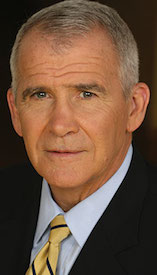
Oliver North
Oliver L. North is an author, political commentator, and military historian. He previously served as host of the FOX News […] More about Oliver North.
- Books by the Author
- Related Articles
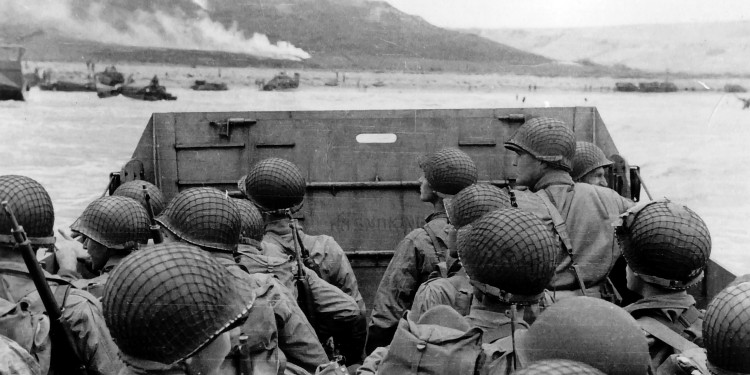
The 10 Best Books About WWII’s European Theater
Although America’s entry into WWII was precluded by an attack in the Pacific, the European theater proved to be equally […]
Ratings Details




